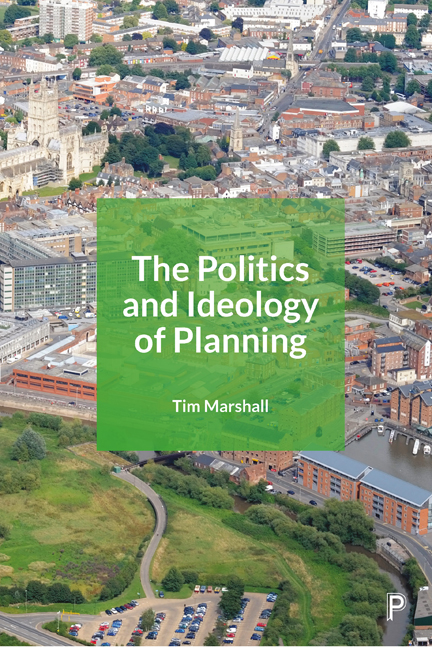Book contents
- Frontmatter
- Contents
- List of figures and tables
- List of abbreviations
- Acknowledgements
- 1 Introducing planning, politics and ideology
- 2 Writing on politics and ideology in planning
- 3 Ideologies in Britain, with initial linking to planning
- 4 Planning history, planning reform and politics and ideology
- 5 Planning expertise and planning law: autonomy from politics and ideology?
- 6 Ideology and politics in government, central and local
- 7 Ideology and politics in professions, lobbying, consultancies and pressure groups
- 8 Communication, the media and deliberation
- 9 Facets of planning action: heritage, local environment and design
- 10 Fields of planning action: housing, economy and infrastructure
- 11 Paths to improving the ideological and political dimensions of planning
- References
- Index
10 - Fields of planning action: housing, economy and infrastructure
Published online by Cambridge University Press: 05 January 2022
- Frontmatter
- Contents
- List of figures and tables
- List of abbreviations
- Acknowledgements
- 1 Introducing planning, politics and ideology
- 2 Writing on politics and ideology in planning
- 3 Ideologies in Britain, with initial linking to planning
- 4 Planning history, planning reform and politics and ideology
- 5 Planning expertise and planning law: autonomy from politics and ideology?
- 6 Ideology and politics in government, central and local
- 7 Ideology and politics in professions, lobbying, consultancies and pressure groups
- 8 Communication, the media and deliberation
- 9 Facets of planning action: heritage, local environment and design
- 10 Fields of planning action: housing, economy and infrastructure
- 11 Paths to improving the ideological and political dimensions of planning
- References
- Index
Summary
A further cut can be taken across the variation of dimensions and fields of planning, by incorporating to a greater extent the differences of the national and local operation which are naturally present in the planning system. Planning is of course distinctive in this way, much more so than in some other areas of public policy such as, say, health or policing (not that variation is not present to certain degrees in those areas, but it is not built into the basic functioning of the system as it is in planning). The three fields examined in this chapter, housing, economic sectors and infrastructure, give more attention to this scalar variation, although still proceeding by means of overviews, rather than detailed longer studies.
Table 10.1 shows schematically how national and local dimensions might be incorporated into analysis of fields. This then creates ‘planning situations’ in any locality. Through the kind of thinking in this table, we start to develop an approach to understanding how the ‘political and ideological planning situation’ of a locality is formed.
Housing
Housing is often the most conflictual planning issue at local level, in varying ways in different localities. Its political and ideological framing and manipulation have taken very different forms in different planning eras. The present era often sees battles between the construction of ‘needed homes’ and protected land areas and environments, as well as the protection of the position of the house building interests and landowners. This set of interactions generates a force field of planning particular to the current UK, which contrasts with the situations in some other international contexts, where very different balances of production interests, state policy positions and local interests and ideological colours are in play.
There is of course much academic writing related to politics and housing, some reviewed earlier. Adams and Watkins (2002) argued that local housing matters are not so much ideologically or party politically driven, but are about stakeholder interests and local interactive politics. They are contrasting this with the setting of national housing politics. Certainly this is an important distinction, and there is certainly much going on locally that is the product of such interest turf wars, not of a ‘deeper’ kind.
- Type
- Chapter
- Information
- The Politics and Ideology of Planning , pp. 195 - 224Publisher: Bristol University PressPrint publication year: 2020



